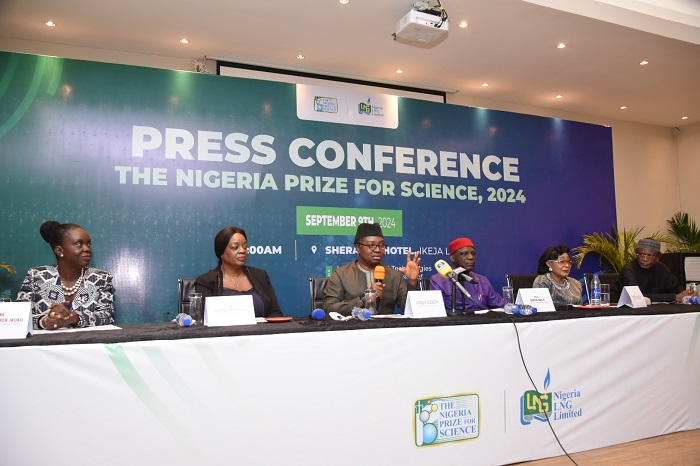The Advisory Board of The Nigeria Prize for Science has named Eni Oko, Olajide Otitoju, and Meihong Wang as the winners of the 2024 edition of the Prize of $100,000.
The trio was recognised for their pioneering work on “Process Intensification Technology for Greenhouse Emission Control in Power Generation and Industry for Sustainable Fuel Production (PIC-FUEL)”.
Speaking at the event in Lagos, NLNG’s General Manager for External Relations and Sustainable Development, Mr Andy Odeh, expressed the pivotal significance of this year’s theme, stressing that combating climate change is not only vital for Nigeria’s future but also essential for the survival of humanity.
He stated, “You can agree with me that the theme of this year’s prize will be of unquantifiable monetary value to the nation, as you know that climate change, arising from green gas emissions, remains a major setback to human development.”
He asserted that the 2024 prize is a particular year for The Nigeria Prize for Science and its sister prize, The Nigeria Prize for Literature, which marks the 20th anniversary of both prizes.
In his remark, the Chairman of the Advisory Board, Nigeria Prize for Science, Prof.Bart Nnaji, said, “This theme is apt because the world today focuses on how to tackle the effects of climate change, especially the reduction of carbon emissions.”
“Out of the 153 entries received, three were found to be of merit. I must praise the professionalism displayed by the chairman of the panel of judges, Professor Francisca Kiki, and our panel members. Today, if any of the entries is worthy of the prize, it indeed deserves it.”
According to him, “The trio won the Prize through their entry “Process Intensification Technology for Greenhouse Gas Emission Control in Power Generation and Industry for Sustainable FUEl Production (PIC-FUEL).”
He said, “The three shortlists were further subjected to thorough scientific analysis and full-scale evaluation using the approved assessment criteria.
“At the end of the intensive investigations, the judges independently affirmed that entries from Eni Okoand Olajide Otitoju, which made use of research findings of Meihong Wang in Carbon Capture, Utilization and Storage (CCUS), were ahead of others.”
Prof. Nnaji explained that the technology involves Carbon Capture, Utilization, and storage (CCUS), where CO2 emissions from industries are captured to make products or stored in the ground, thereby providing a transition towards achieving a net zero emissions target.
He said, “The PIC-FUEL concept is a technology in which flue gases from power plants, petrochemicals, cement, refinery, or heavy industries enter the rotating packed bed (RPB) where CO2 is absorbed using a solvent (for example, MEA).
“The CO2-rich solvent after that goes to the electrolyzer unit where the CO2 is desorbed from the solvent through a reaction with hydrogen to produce methanol (a chemical or fuel).
“The methanol can then be directly blended with diesel or sold as a product. The technology was used directly in the Cyclone CCTM development by Carbon Clean Solutions UK Ltd and in the Compact Carbon Capture Plant development by Baker Hughes in Norway.”











